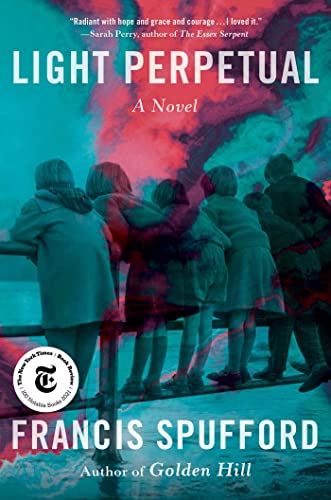
Description
“Mr. Spufford is an amused and amusing observer of human beings, and it is a pleasure to be in his company.” — Dwight Garner, The New York Times “Francis Spufford is one of the cleverest and most thoughtful nonfiction writers in England.… Unapologetic is exactly what those who’ve followed Spufford’s career might have suspected it would be: an incredibly smart, challenging, and beautiful book, humming with ideas and arguments.” — Nick Hornby “A remarkable book, which is passionate, challenging, tumultuously articulate, and armed with anger to a degree unusual in works of Christian piety.” — Sunday Times (London) “The man writes like a dream.” — The Guardian “A subtle, witty, clever writer.” — The Observer “This is a wonderful, effortlessly brilliant book.” — Evening Standard (London) “The point...is to show those on the fence that belief need not mean the abandonment of intelligence, wit, emotional honesty. In this, Francis Spufford succeeds to an exceptional degree.” — London Times Literary Supplement “Catnip for atheists, agnostics, believers, disbelievers and people who like to think and wonder.” — Chicago Tribune “Spufford’s defense of Christianity is as unique as it is refreshing.…With unrelenting passion and honesty throughout, this book successfully accomplishes what it sets out to achieve―namely, making the case for the intelligibility and dignity of Christian faith.” — Booklist “Fresh, lively, provocative, insightful, articulate, witty, scabrous, honest, shocking, profane, Christian.” — James Martin, S.J., author of The Jesuit Guide to (Almost) Everything “A unique book, cutting its way ruthlessly through thickets of both religious and anti-religious sentimentality; painfully funny at points, always impassioned and never glib.” — Rowan Williams, Master's Secretary, Magdalene College, Cambridge University and former Archbishop of Canterbury “Flat-out exhilarating.…Read this book and you will discover a faith that is brash, poignant, sensual, funny―but above all, profoundly, joyfully human.” — Diana Butler Bass, author of Christianity After Religion “Compelling....Spufford’s argument occassions the much needed reevaluation of how integral emotions are to being human and why common sense ought not be dismissed. This is a compelling argument not only for its content but also because it has been written so beautifully.” — Stanley Hauerwas Duke University, author of A Community of Character: Toward a Constructive Christian Social Ethic “Spufford exhibits his trademark brilliance, humor, and acumen, demolishing the intellectual emptiness of the New Atheism along the way. Richly rewarding to mind and heart, and a fine example of one of the era’s best writers at full tilt. ” — Library Journal “Spufford is one of the most gifted English writers of his generation…Unapologetic captures the texture of today’s life of faith, faith always ever-so-slightly but also ever-so-constantly eaten away at by uncertainty, by the possibility of a truly disenchanted world, a wholly material life.” — Books & Culture First published in the United Kingdom to great acclaim, Unapologetic is a wonderfully pugnacious defense of Christianity. But it isn't an argument that Christianity is true—because how could anyone know that (or indeed its opposite)? It's an argument that Christianity is recognizable, drawing on the deep and deeply ordinary vocabulary of human feeling, satisfying those who believe in it by offering a ruthlessly realistic account of the grown-up dignity of Christian experience. Unhampered by niceness, this is a book for believers who are fed up with being patronized, for non-believers curious about how faith can possibly work in the twenty-first century, and for anyone who feels there is something indefinably wrong, literalistic, anti-imaginative, and intolerant about the way the atheist case is now being made. Francis Spufford, a former Sunday Times Young Writer of the Year (1997), has edited two acclaimed literary anthologies and a collection of essays about the history of technology. His first book, I May Be Some Time , won the Writers' Guild Award for Best Non-Fiction Book of 1996, the Banff Mountain Book Prize, and a Somerset Maugham Award. His second, The Child That Books Built , gave Neil Gaiman "the peculiar feeling that there was now a book I didn't need to write." His third book, Backroom Boys, was called "as nearly perfect as makes no difference" by the Daily Telegraph , and Red Plenty was one of Dwight Garner's New York Times 10 Favorite Books of 2012. Spufford is a Fellow of the Royal Society of Literature and teaches at Goldsmiths College in London. Read more
Features & Highlights
- Francis Spufford's
- Unapologetic
- is a wonderfully pugnacious defense of Christianity. Refuting critics such as Richard Dawkins, Sam Harris, and the "new atheist" crowd, Spufford, a former atheist and Fellow of the Royal Society of Literature, argues that Christianity is recognizable, drawing on the deep and deeply ordinary vocabulary of human feeling, satisfying those who believe in it by offering a ruthlessly realistic account of the grown-up dignity of Christian experience.
- Fans of C. S. Lewis, N. T. Wright, Marilynne Robinson, Mary Karr, Diana Butler Bass, Rob Bell, and James Martin will appreciate Spufford's crisp, lively, and abashedly defiant thesis.
- Unapologetic
- is a book for believers who are fed up with being patronized, for non-believers curious about how faith can possibly work in the twenty-first century, and for anyone who feels there is something indefinably wrong, literalistic, anti-imaginative and intolerant about the way the atheist case is now being made.





